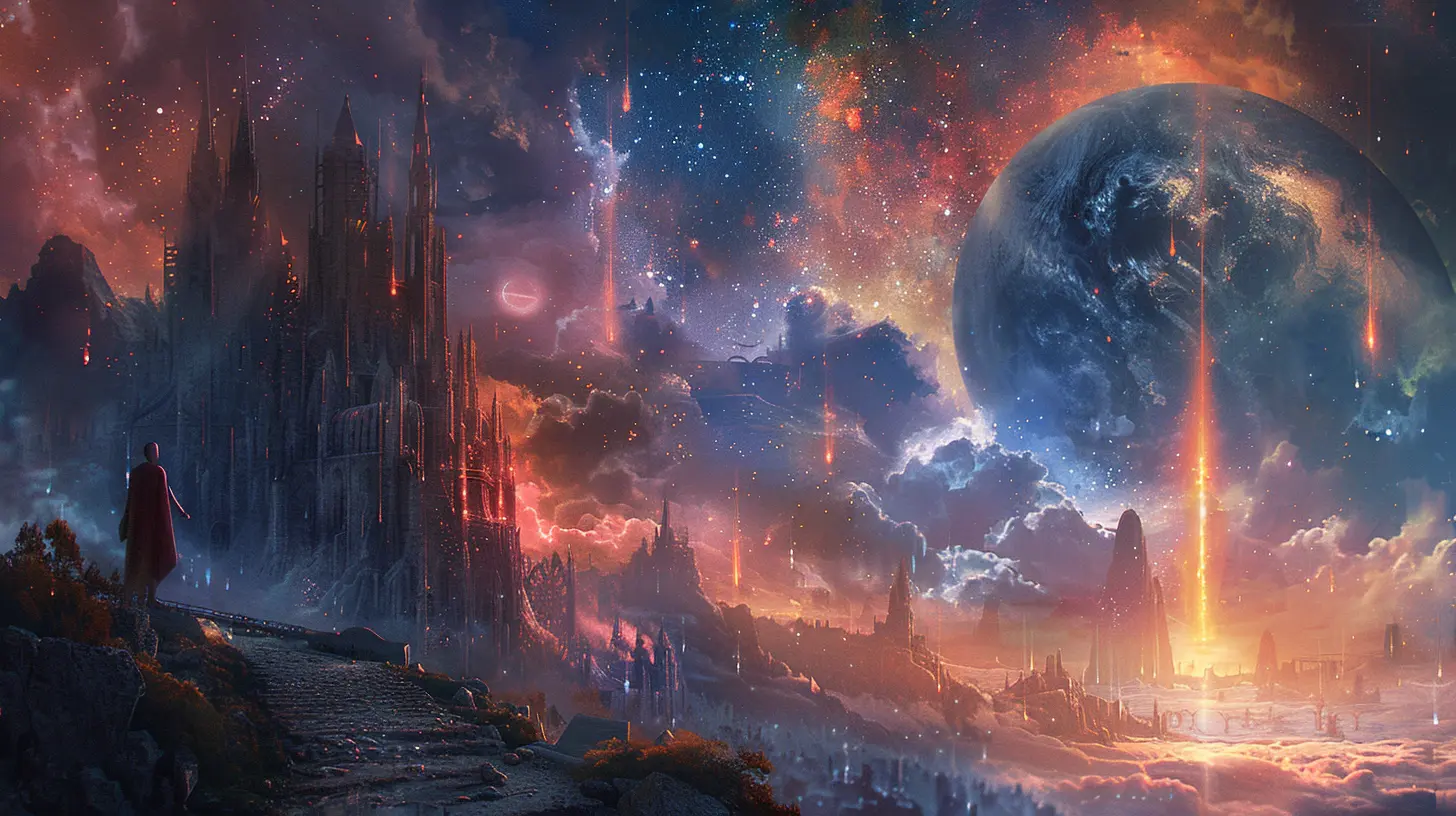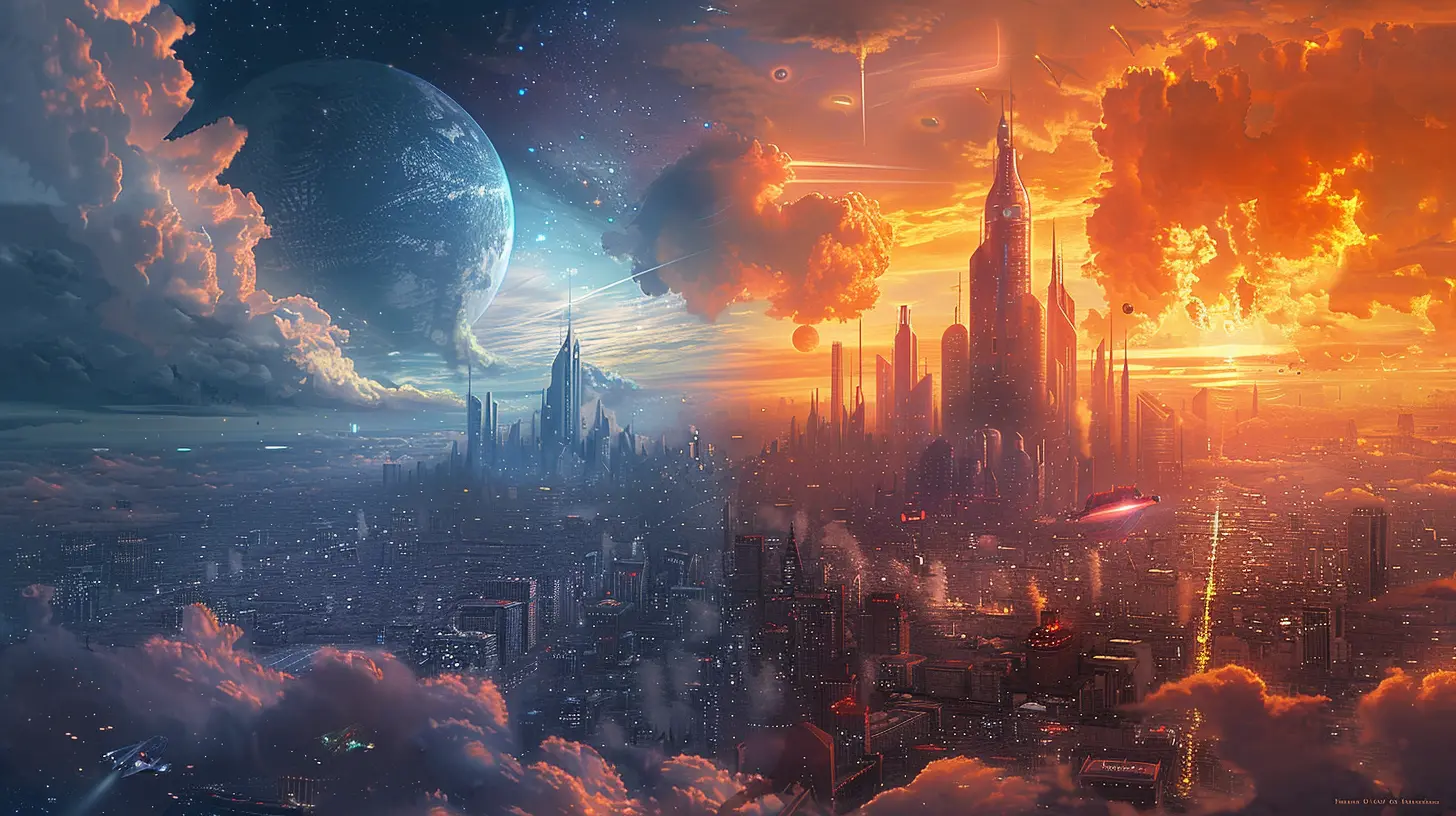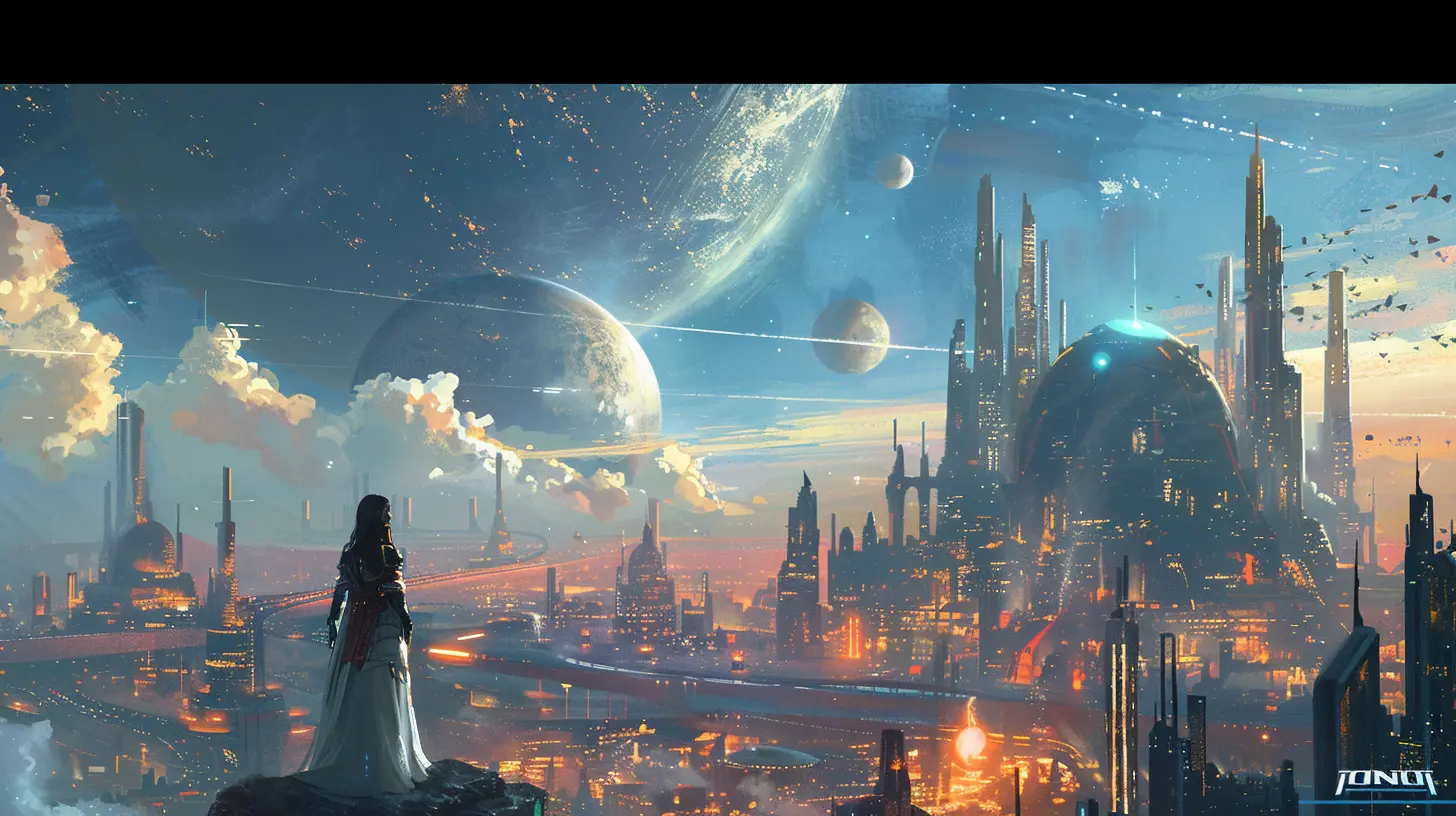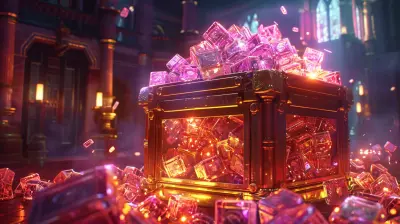Fantasy Realms vs Sci-Fi Universes in Games
15 November 2025
When it comes to video games, two genres have always stood out as the biggest crowd-pullers: fantasy and science fiction. You've got dragons on one side and spaceships on the other. Magic spells clash with laser blasters, and enchanted forests compete with neon-lit alien cities. But which one truly reigns supreme in the gaming world? Or do they each offer something unique that keeps players coming back for more?
Let’s break it all down in this ultimate face-off between Fantasy Realms vs Sci-Fi Universes in Games.
The Basics First: What’s Fantasy, What’s Sci-Fi?
Before we dive into swords and starships, let’s get our definitions straight.- Fantasy Games: These are the ones filled with magic, mythical creatures, ancient kingdoms, and usually a hefty dose of good vs. evil. Think The Elder Scrolls, Dragon Age, or The Legend of Zelda.
- Sci-Fi Games: Science fiction leans into futuristic tech, alien species, interstellar travel, and often explores complex ethical or philosophical themes. We’re talking about games like Mass Effect, Halo, or Cyberpunk 2077.
Now that we’ve drawn the line in the sand (or stardust), let’s jump into what makes each of them awesome—and a few downsides too.
The Allure of Fantasy Realms
1. Timeless Magic and Myth
Fantasy has a charm that feels ancient and universal. It taps into folklore, mythology, and the age-old hero’s journey. There’s something inherently appealing about starting as a humble villager and growing into a legendary knight or mage.You get to sling spells, tame dragons, and wield weapons with names like “Shadowfang” or “Eternal Flameblade.” That alone is enough to hook any RPG lover.
2. Rich Worldbuilding
Fantasy games often take the time to build worlds brick by enchanted brick. The lore is deep—sometimes overwhelmingly so. From the lands of Tamriel in Skyrim to the political houses of The Witcher, every corner of the map tells a story.You don’t just play in these worlds; you live in them. You chat with blacksmiths, take on side quests from grieving widows, and stumble upon ancient ruins with forgotten magic.
3. Escapism at Its Best
Let’s face it: sometimes you just want to escape the modern world with its emails and calendars. Fantasy offers that total break. No phones, no space stations—just you, a glowing sword, and a destiny you’re only beginning to understand.But Wait... What’s the Catch?
Now, fantasy isn’t perfect. Sometimes it sticks too closely to clichés—elves are noble, dwarves are gruff, and the chosen one always seems to be you. Also, the lack of modern or futuristic tech can make some gameplay elements feel a bit limited or repetitive.
The Sci-Fi Side of the Galaxy
1. Tech, Space, and the Unknown
If fantasy looks to the past, sci-fi is all about the future. It's a genre that asks "What if?" and runs with it. What if humans colonized Mars? What if AI took over? What if you could upload your consciousness to the cloud?Sci-fi games are often idea-driven, blending action with thought-provoking themes. Games like Deus Ex or Detroit: Become Human explore transhumanism, morality, and identity in ways that fantasy often shies away from.
2. Expansive Universes and High Stakes
There’s something thrilling about jumping from one solar system to another, gathering alien allies, and facing threats across multiple planets. The scale in sci-fi games is often staggering. You’re not just saving a village; you’re saving the galaxy.And let’s not forget cool gear—lasers, jetpacks, cybernetic enhancements. Sci-fi lets developers go wild with creativity when it comes to gadgets and gameplay mechanics.
3. Scientific Sandbox
Unlike fantasy, where magic often works “just because,” sci-fi leans into logic, even if it’s fictional logic. There’s usually an in-world explanation for everything, from how warp drives work to what powers a mech suit.That structure can be incredibly satisfying. Want to reroute power to shields or hack into doors? Sci-fi makes those actions feel believable and strategic.
The Flip Side?
Sometimes sci-fi takes itself a little too seriously. It can get bogged down in techno-babble or heavy-handed exposition. Not everyone wants a lecture on quantum physics when they’re trying to shoot laser pigs on an alien moon.Plus, while the visual design is often stunning, some sci-fi worlds can feel cold or sterile compared to the warmth and greenery of a fantasy landscape.
Fantasy vs Sci-Fi: Side-by-Side Showdown
| Feature | Fantasy Realms | Sci-Fi Universes ||---------------------------|-------------------------------------|------------------------------------------|
| Setting | Medieval-inspired, magical worlds | Futuristic tech, space travel |
| Tone | Mythic, mystical, sometimes whimsical | Logical, cerebral, often philosophical |
| Characters | Knights, elves, dragons | Soldiers, hackers, aliens |
| Weapons | Swords, bows, magic staffs | Guns, lasers, AI drones |
| Themes | Heroism, destiny, good vs evil | Ethics, evolution, survival, dystopia |
| Gameplay Mechanics | Magic systems, melee combat | Hacking, piloting, resource management |
| Biggest Strength | Immersive storybook feeling | Strategic depth and futuristic tech |
| Biggest Weakness | Can feel repetitive or cliché | Can feel cold, overly complex |
Popular Examples That Define Each Genre
Fantasy Titans
- The Elder Scrolls V: SkyrimAn open-world fantasy epic where you’re the Dragonborn meant to stop an ancient prophecy. Magic, dragons, and shouts included.
- Dark Souls
A grim, unforgiving masterpiece full of cryptic lore and brutal swordplay. It’s fantasy at its darkest and most mysterious.
- The Witcher 3: Wild Hunt
Complex characters, moral ambiguity, and rich storytelling—this one raised the bar for fantasy RPGs everywhere.
Sci-Fi Giants
- Mass Effect SeriesChoices matter, aliens are your best friends (and maybe more), and the fate of civilization rides on your shoulders.
- Cyberpunk 2077
Despite a rocky launch, the game's deep world and gritty depiction of tech-infused dystopia hits the cyberpunk sweet spot.
- Halo Series
A legendary franchise that mixes epic war, alien species, and iconic weapons like the Energy Sword and Master Chief’s infamous MA5B Assault Rifle.
Why Some Players Prefer One Over the Other
Let’s be honest—choosing between fantasy and sci-fi often comes down to personality.- Are you a dreamer? Do you want to lose yourself in enchanted lands and ancient prophecies? Fantasy’s got your back.
- Are you curious about the future? Love gadgets, high-stakes strategy, and galactic politics? Sci-fi has you covered.
Some players stick to one side religiously, while others jump between the two based on mood. And that’s totally cool—both genres have their highs and lows.
The Hybrid Games: Best of Both Worlds?
More and more, we see games blending the lines between fantasy and sci-fi. These hybrids are genre-bending and often bring out the strengths of both worlds.Examples?
- Destiny 2: It’s got space travel and alien weapons—but it also features magic, relics, and a mysterious force called “The Light.”
- Final Fantasy Series: Especially later entries like Final Fantasy XV, which mix high-tech machinery with magic spells and fantasy creatures.
These games challenge the idea that you have to pick one or the other—and honestly, they’re some of the most exciting to play.
Community and Culture Clash
One interesting side note? The communities around these genres can be wildly different.- Fantasy Fans tend to value lore, immersion, and deep role-playing. They love getting into character and can spend hours debating the political structure of elven kingdoms.
- Sci-Fi Fans are more into theory-crafting, easter eggs, and dissecting the tech behind the fiction. They’ll write entire Reddit posts on whether a certain weapon could exist IRL.
Both communities are passionate, and when things cross over (like Star Wars, which has both magic-like Force powers and spaceships), you can practically hear the keyboards clacking.
So… Which Wins?
Honestly? Neither.And both.
It’s not about who wins. It’s about what you’re in the mood for. Fantasy and sci-fi don’t have to compete—they complement each other. One gives us tales of magic and mysticism; the other offers a vision of what could be. They’re two sides of the same gaming coin.
So, next time you're scrolling through your game library, maybe ask yourself: Am I feeling like a space commander dodging meteors, or a wandering sorcerer hunting ancient demons?
Because the beauty is—whichever you choose, there’s an epic adventure waiting.
Final Thoughts
Fantasy realms and sci-fi universes are both powerhouses in the world of gaming. They’ve given us unforgettable stories, iconic characters, and countless hours of immersion. Whether you’re drawn to spellbooks or starships, there’s no wrong choice—just different flavors of awesome.Game on!
all images in this post were generated using AI tools
Category:
Game WorldsAuthor:

Leandro Banks
Discussion
rate this article
2 comments
Quorra Ortiz
In realms of magic and stars, we play; where dragons soar and spaceships glide, imagination knows no bounds, forever astray.
November 22, 2025 at 5:17 AM

Leandro Banks
Thank you for your poetic take! Both fantasy and sci-fi offer limitless worlds, each with unique wonders that captivate our imaginations.
Zayden McLaury
Why choose? I’d gladly quest for dragons in a spaceship while sipping alien coffee—best of both worlds!
November 15, 2025 at 5:58 AM

Leandro Banks
That's the dream! Combining elements from both genres can create truly unique and immersive experiences. Why not enjoy the adventure in any form?


